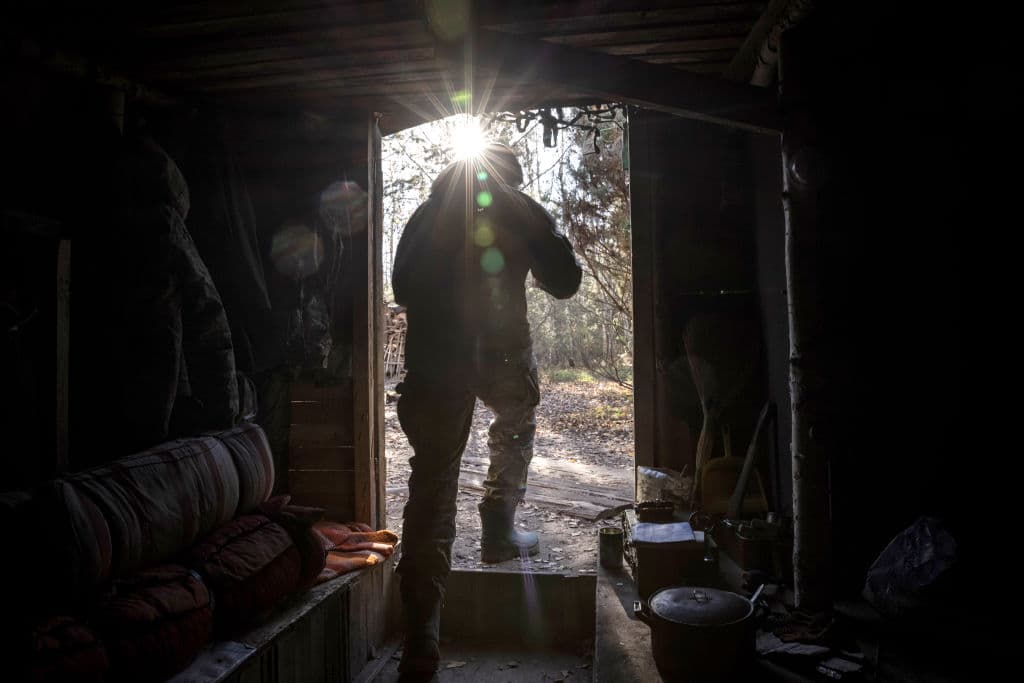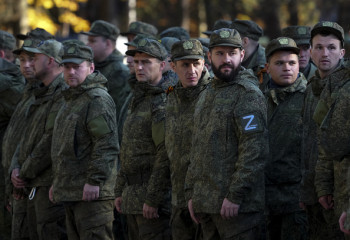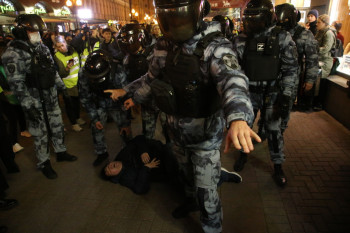Belarus Weekly: Ukraine builds fence along border with Belarus

Kyiv constructs a wall to fortify its border with Belarus as Minsk prepares to hold large-scale mobilization drills at the end of the year.
Belarusian monitoring group Belarusian Hajun reports additional Russian aircraft in Belarus.
As regional military authorities requisition 50,000 mobilization summons, concern over covert mobilization in Belarus rises.
Belarusian dictator Alexander Lukashenko’s regime continues to back Moscow, as Belarus votes against a UN resolution calling for Russia to pay reparations to Ukraine. The resolution passed anyway.
Lukashenko further isolates Belarus from the outside world as he threatens to nationalize foreign investors’ property in Belarus.
A prominent Belarusian human rights activist reports being tortured by Belarusian authorities.
Nov. 12 marked the anniversary of one the darkest days of Belarusian 2020 protests.
Raman Bandarenka was beaten and killed by Belarusian security forces, sparking a wave of protests that resulted in over a thousand protestors being detained by Belarusian law enforcement.
Ukraine builds fence along border with Belarus
Ukraine is constructing a fence reinforced with barbed wire, a ditch, and an embankment to fortify its border with Belarus, according to Ukrainian officials.
According to Deputy Head of the President’s Office Kyrylo Tymoshenko, the wall already spans three kilometers in Volyn Oblast, and construction is also ongoing in Ukraine’s Rivne and Zhytomyr oblasts.
“This is not the end of it, but we are not going to disclose details,” Tymoshenko said.
The General Staff of Ukraine’s Armed Forces also reported on Nov. 10 that Ukrainian forces are mining the regions bordering Belarus.
Belarus is a co-belligerent in Russia’s full-scale war against Ukraine, having facilitated the transit of Russian troops and the launching of weapons from Belarusian territory.
Poland, Latvia, and Lithuania also started to construct fences along their borders with Belarus, primarily designed to prevent migrants from illegally entering the EU from Belarus amid the ongoing migrant crisis engineered by Minsk.
Belarus may hold large-scale mobilization drill
Military authorities in Belarus’ Brest region have requisitioned 50,000 mobilization summons by Dec. 31, the General Staff of Ukraine’s Armed Forces reported on Nov. 14.
Belarus’ Defense Ministry said the request is a “standard procedure,” denying any connection with mobilization in Belarus. Regional military authorities in the Brest region reiterated the claim.
Lukashenko emphasized on Oct. 4 that Belarus does not “need to announce mobilization,” blaming rumors on those who oppose his regime.
However, he noted that Belarusian authorities are conducting checks of military personnel and those liable for military service in the country’s reserves.
Belarus’ Defense Ministry reiterated the statement, claiming that registration, conscription, and mobilization are undertaken only for reservists and as part of planned exercises, which can be ruled as a veiled mobilization.
Local media outlets, citing residents and conscripts from the Homiel region, said mass mobilization drills are planned in southern Belarus for November and December of this year.
Belarus votes against UN resolution for Russia to pay reparations to Ukraine
Belarus voted against the resolution passed by the UN General Assembly on Nov. 14, calling for Russia to be held accountable for breaching international law by launching its full-scale invasion of Ukraine.
The resolution stated that Moscow “must bear the legal consequences of all of its internationally wrongful acts, including making reparation for injury, including any damage, caused by such acts.”
In total, 94 countries voted in favor of the resolution, while 14 nations voted against the measure and 73 countries abstained from voting. Belarus, Russia, the Central African Republic, China, Iran, and North Korea were among the countries that voted against the resolution.
Lukashenko threatens to nationalize foreign investors’ property in Belarus
During a visit to Belarus’ Vitebsk region, Belarusian dictator Alexander Lukashenko said he wants to nationalize enterprises operating in Belarus with foreign investors from so-called “unfriendly countries.”
“I don’t want to see any more Lithuanians, Finns, and other (foreigners) here,” Lukashenko said. “We can do it ourselves.”
The Lithuanian Confederation of Industrialists President Vidmantas Janulevicius said such a move would warrant a lawsuit via the European Commission.
On July 5, Belarus’ Council of Ministers introduced a resolution preventing foreign investors from selling their shares in 190 Belarusian companies without government authorization.
The ban will reportedly apply to investors from countries that Belarus accuses of “unfriendly acts.” As of July 6, affected shares were frozen until further action is authorized by Belarus’ Finance Ministry.
These companies include the country’s largest retailers, e-commerce companies, and manufacturers, including EPAM Systems, Wargaming, Eurotorg, and Dana Astra. Most affected companies are reportedly owned by Belarusian nationals with foreign investors, from Cyprus, Lithuania, the U.K., and Poland.
Belarusian monitoring group observes Russian aircraft over Belarus
Belarusian monitoring group Belarusian Hajun published photos of Russian MiG-31K supersonic interceptor aircraft flying over Belarusian territory on Nov. 13.
Belarusian Hajun also noted eight arrivals of Russian Il-76 aircraft to Belarus’ Machulishchy Airfield. The monitoring group suggested that the arrivals may indicate the import or export of military equipment or weapons to or from Belarus and Russia.
According to the U.K. Defense Ministry, Russia deployed two MiG-31K supersonic interceptor aircraft to Belarus’ Machulishchy Airfield on Oct. 17. The jets are likely capable of carrying Kinzhal air-launched ballistic missiles.
Human rights activist claims torture by Belarusian authorities
Belarusian human rights activist Nasta Loika, who was detained for 15 days on Nov. 14 for alleged “hooliganism,” claimed she was tortured during her interrogation.
Loika, who focuses on Belarus’ repressive “anti-extremist” laws and human rights issues, said Belarusian authorities tortured her with tasers and subjected her to freezing temperatures for eight hours.
The International Committee for Investigations of Torture in Belarus published a report describing the torture undertaken by the Belarusian Interior Ministry’s Main Directorate for Combating Organized Crime and Corruption against political prisoners. Reports mention the use of tasers, heavy beating, and sexual assault.











